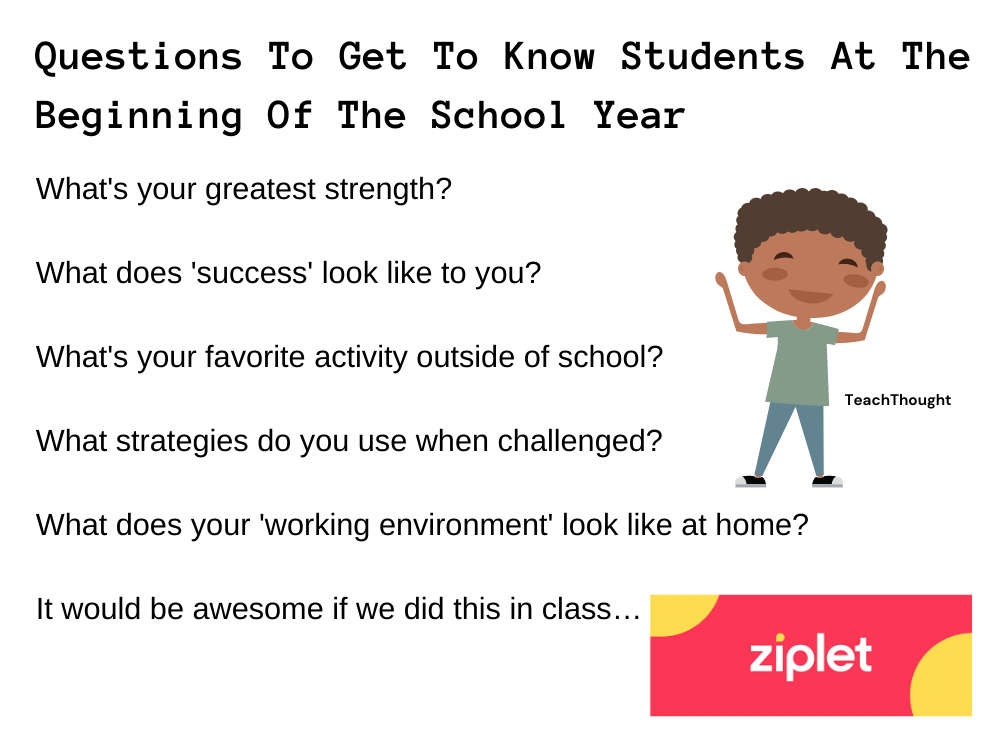6 Questions To Get To Know Students At The Beginning Of The School Year
contributed by Chris Butterworth, ziplet.com
This is sponsored content. You can read more about our sponsored content policy here.
It’s back to school time. : )
Whether you’ve been teaching forever or are a newbie, it’s a critical time that sets the tone for the rest of the year–especially in light of the extraordinary global events of the last 18 months, not the least of which for many was a shift to remote teaching and learning.
Students entering your class are wondering: how will I feel in this class? Will my teacher understand me? Will I be comfortable amongst my peers?
Each student has their own story. Their own unique aspirations, challenges, and experiences. It’s our job to go beyond surface-level introductions. To really listen when our students tell us who they are. Knowing our students will improve our teaching and their learning. So what should we find out?
Here are six meaningful questions to ask students as they enter your classroom.
1. What’s your greatest strength?
“There needs to be a lot more emphasis on what a child can do, instead of what they cannot do.” – Temple Grandin
We all have strengths. As teachers, it’s our job to help students utilize these.
By encouraging students to identify their best qualities, we are:
- enhancing their motivation and self confidence
- improving their achievements
- increasing student-teacher rapport
You might like to have a whole class brainstorm of different types of strengths. This can help students to identify their own.
2. What will ‘success’ in this class look like for you?
Success means different things to different people.
For some, it’s all about achieving the end goal. For others, it’s more about the process and the learning along the way. As teachers, it’s our responsibility to help our students recognize what success means for them. We can then challenge their perceptions to support their learning.
It’s a great idea to first have a class discussion about what success looks like in our society. Ask students how that makes them feel, and what they would change about the way it’s viewed. Knowing what success means to our students helps us to:
- understand their self-perception
- motivate them accordingly
- adjust our expectations as teachers
3. What’s your favorite activity to do outside of class?
We all know that students have lives outside of school. It’s our privilege and responsibility to tap into these real-life experiences.
Asking this question shows students that we value their experiences beyond the classroom. When students feel like we’re invested in them, they’re more likely to feel motivated to do their best. We can also adjust our teaching to encourage students to use a hobby to support their learning.
For instance, if a student enjoys listening to podcasts, encourage them to find some that are linked to concepts taught. The same concept could be applied to YouTubers, streamers, video games, books, etc.
4. What strategies do you use when classwork is challenging?
Asking this question provides insight into the students’ approach to learning.
As a teacher, you can support your student in identifying relevant approaches. Students are encouraged to identify emotional and cognitive strategies used for overcoming challenges. For example, taking a deep breath, having a break, and recording their thoughts.
It can also relate to specific learning strategies. You might recommend that students use these to help understand a challenging concept. Once you’re aware of student strategies, you can encourage them to use these when they are struggling with new concepts and skills.
5. What does your ‘working environment’ look like at home?
As teachers, we know that learning doesn’t occur in a vacuum.
It’s essential for students to have a supportive home environment. Without it, they’ll struggle to consolidate their learning. As a class, identify what a ‘good working environment’ looks like. This includes access to learning materials, supportive furniture, a quiet space, and a reliable internet connection.
Students might be embarrassed to discuss these challenges openly. Using tools such as Ziplet, it’s never been easier to gain insights while maintaining student confidentiality. Gaining insight into their home challenges helps to foster our compassion. As a result, we adjust our teaching process to suit individual student needs.
Armed with this knowledge, we’re empowered to support students. We can discuss changes that can be made or direct them to support services.
6. It would be awesome if we did this in class…
Learners know better than anyone what their preferences and dislikes are.
According to Amelia Ruscoe from ECU’s School of Education, they are ‘in the best place to provide feedback…(we are) acknowledging that they have agency and respectfully giving them input.’ When students feel heard, their motivation levels for learning increase. Encourage students to reflect on both how and what they’d like incorporated into teaching and learning.
You’ll likely receive a practical and varied bank of suggestions from your students. You can tailor your teaching to suit students’ preferences for learning.
Conclusion
The start of the year is an exciting time for you and your students. It’s the perfect opportunity to get to know your students on a deeper level. The better you know them, the more you can calibrate your teaching to meet their needs and improve learning outcomes.
You can find all these questions and more in Ziplet, a free tool for teachers that makes exit tickets easy. Try it for yourself, create your free account.
